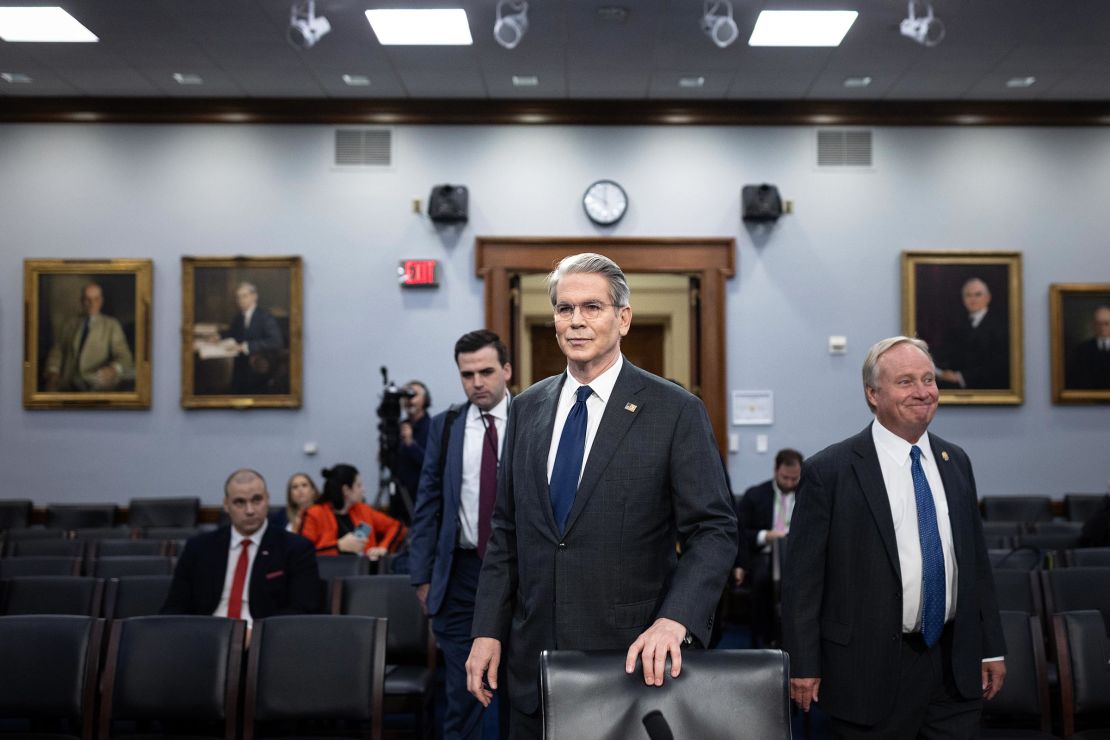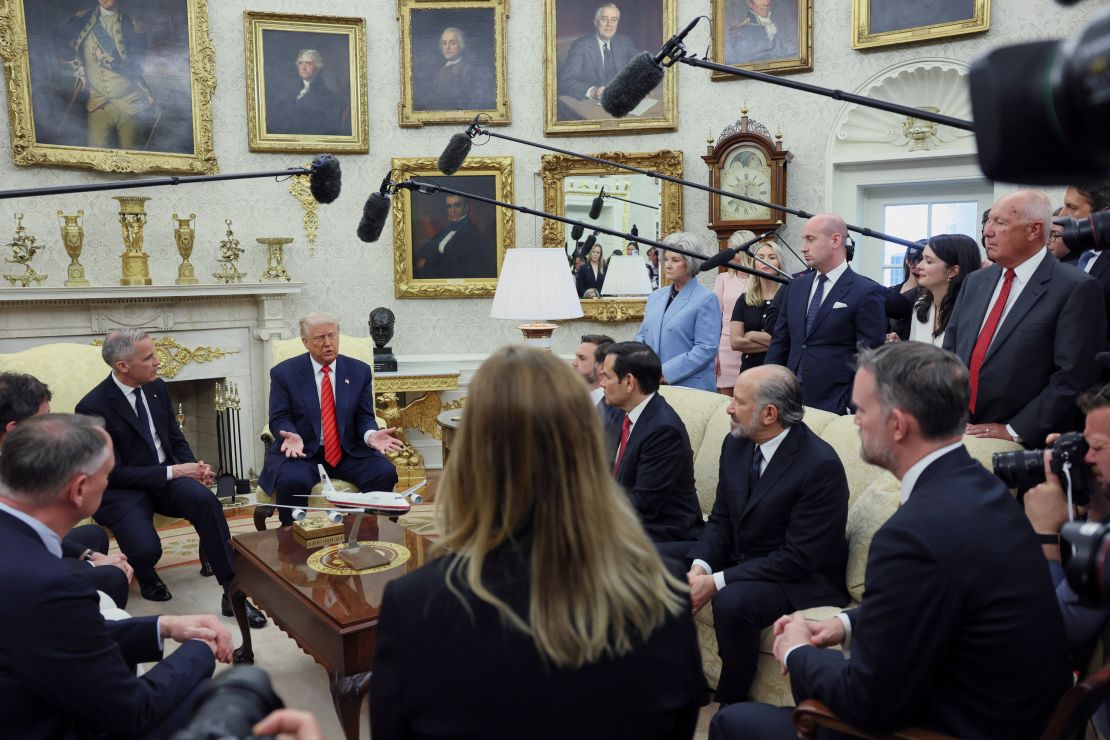CNN
—
President Donald Trump’s lifelong belief that tariffs can make the United States even richer by forcing other nations to bend to his demands is only being reinforced by the early skirmishes in his trade wars.
But this worldview is facing its acid test at a moment when Americans are about to feel its painful consequences.
Treasury Secretary Scott Bessent will meet with Chinese officials this weekend in neutral Switzerland, a venue that will lend an echo of US-Soviet Cold War summits to the most serious economic showdown yet between the two 21st-century superpowers.
The talks, which will also include US Trade Representative Jamieson Greer, represent the most critical moment in the trade wars so far. Global markets will hope for at least a temporary de-escalation in a clash that Trump escalated in the first place with his punishing 145% tariff on Chinese goods.
But Trump’s strategy and rhetoric in recent days are likely to complicate Bessent’s assignment, since the president is showing that his faith in tariffs is undimmed by a dose of negative US growth and signs of a looming supply crunch.
In fact, he’s becoming more set in his belief not just that wielding massive trade penalties against foreign countries is the right thing to do, but also that it’s working.
“They want to meet,” Trump said of Chinese leaders in the Oval Office on Tuesday. “They’re doing no business right now, and those ships are turning around in the Pacific Ocean … by not trading, we’re losing nothing.”
Investors, business leaders and consumers will hope the president will take a quick, face-saving exit out of his trade wars. But Trump’s statements suggest that tariffs may not be the means to an end, but the end itself. And while trade deals with the US are possible, the terms for foreign nations are likely to be tough and may never result in a return to the low-tariff global economy of the past.
Despite days of predicting a flood of trade agreements are imminent, the administration has yet to announce any new breakthroughs, so there is no real prospect of tariffs being lifted any time soon.
Trump’s volatility and record of changing his mind on a dime mean that none of his statements should ever be regarded as definitive. And the gathering storm caused by his policies as the threat of a recession grows and Americans begin to see shortages in stores could leave him no choice but to step back.
The talks with China will be key to establishing whether a soft landing is possible for the trade wars — perhaps avoiding a major economic slowdown.

Bessent told Fox News on Tuesday that his initial plan is to try to cool the confrontation and that the talks with Chinese officials represent the “missing piece” in the administration’s strategy and will take place on a trip during which he had previously planned to talk trade with Swiss officials.
But China typically favors intricate trade talks that play out for months. And Bessent cautioned that he didn’t expect to be discussing “the big trade deal” yet.
And a growing number of Trump’s comments and social media posts suggest that he’s not yet interested in changing course a third of the way through a 90-day pause in reciprocal tariffs.
On Tuesday, he played down expectations for a flurry of trade deals that he and senior aides had been predicting were imminent for days — moments after his treasury secretary said on CNBC that he expected to announce deals with top trading partners “as early as this week.”
The president seemed frustrated at the suspense he’d helped to build. Perhaps this means that trade talks are going more poorly than the administration is ready to admit. Or Trump could have his eye on a different endgame.
“So, I wish they’d keep — you know, stop asking, ‘How many deals are you signing this week?’ Because one day, we’ll come and we’ll give you a hundred deals,’” Trump said, before trying to clarify that his preferred outcome of the trade deals may be permanent protectionism. “And I think my people haven’t made it clear. We will sign some deals, but much bigger than that is, we’re going to put down the price that people are going to have to pay to shop in the United States.”
Trump as the world’s ‘luxury store’ owner
In Oval Office talks with Canadian Prime Minister Mark Carney, the president explained his vision of operating as a retailer who sets the price for each individual customer. In this scenario, tariffs are not an attempt to draw countries into talks to unlock acceptable deals for both sides. Instead, they are a way to fix a levy for the right to do business with the US that would depend on how far each nation sacrifices their own economic interests to boost America’s. “Think of us as a super-luxury store, a store that has the goods. You’re going to come and you’re going to pay a price, and we’re going to give you a very good price,” Trump said.
This means the old world is gone.
Trump also said last month that his 145% tariff on China will “come down come down substantially, but it won’t be zero.” And he told Time Magazine in a recent interview that he’d consider it a “total victory” if tariffs — an economic device he’s viewed with almost mystical reverence for decades — are at 50%.
This may require adjusting expectations on global markets and in foreign capitals. Perhaps Trump falls short of his long-shot goal of returning manufacturing to the United States to levels in place before the entry of nations like China and Vietnam into the global economy in the late 20th century. But it’s increasingly clear that, at least while he’s in the Oval Office and controls what is still the world’s most powerful economy, the days of untamed globalization are over.
Moreover, it’s becoming clear that the president doesn’t see any future deals as just a reset for the global trading system. He wants to transform it so that the US becomes a manufacturing and exporting giant but doesn’t buy things from abroad. “They have to sign deals with us,” the president said. “If they want a piece of our market — we don’t want a piece of their market. We don’t care about their market. They want a piece of our market.”
This is a mind-bogglingly impractical strategy, even if it shows unshakeable belief in the potential of the American people and the country’s industrial machine. It ignores the fact that millions of Americans like to buy low-priced foreign goods that would be more expensive if made in the US. Such purchasing power has improved the lifestyles of the middle and working classes, who can now afford items like flat-screen TVs and other electronics as well as essentials such as clothes. Trump’s strategy also ignores that other nations make things global consumers want to buy, too — not just staples but luxury goods that are not endemic to the US.
A looming age of austerity?
The president’s thinking may be radical, but it does track with other recent comments — including his warning that American children would have fewer and more expensive dolls and pencils — that suggest the president foresees a new age of austerity despite his vows to make America rich again.
In this sense, his comments on trade alongside Carney, who was just elected to lead the country that buys more US products than any other, offered a striking glimpse into how he thinks.
Having a president set the price of access to the US market would be an extraordinary way to run a 21st-century economy. It may also be an illegal and unconstitutional use of executive power.
And since Trump has a foggy understanding of how how tariffs work — he sees them as a massive source of revenue for the government rather than a huge tax on American consumers — his approach would also come with serious risks for the US economy.
Attempts to artificially control the price of goods usually causes shortages and supply chain issues, and they can spike inflation. Such a top-down system is also prone to manipulation. Trump has already granted temporary tariffs carve-outs on some tech products, including iPhones, and to parts manufacturers that supply the auto industry after lobbying from CEOs. Such interactions allow the president to take the spotlight and move the chess pieces around the board — a common thread in many of his policies.
And in an administration with a remarkably cavalier attitude to ethics, such as system is ripe for corruption. What is to stop a company or country offering Trump a favor or inducements that boost his companies to get preferential treatment?
“We don’t want steel from Canada ‘cause we’re making our own steel,” Trump said Tuesday. “We really don’t want Canadian steel and we don’t want Canadian aluminum and various other things because we want to be able to do it ourself.”

Such aspirations show that Trump is not simply pushing a vision of self-sufficiency; he’s envisioning a real attempt to drive other nations out of business to make them dependent on America. He may have soft-pedaled his territorial claim on Canada with Carney in the room, but his trade policies would have a similar effect.
“We don’t really want cars from Canada. And we’ve put tariffs on cars from Canada, and at a certain point, it won’t make economic sense for Canada to build those cars,” Trump said, in a comment that rhymed with the rationale of his “America first” foreign policy — to leverage US might to exert control over smaller, less powerful nations.
“We’ve been ripped off by everybody for 50 years, for 50 years, and we’re just not going to do that anymore. We can’t do that, and we can’t let any country do that to us,” Trump said.
He’s being saying this for decades: as a businessman, as a candidate and now as a second-term president. It’s a narrow and cynical view of the world. But it might be time for Trump’s critics to accept that he really means it.


